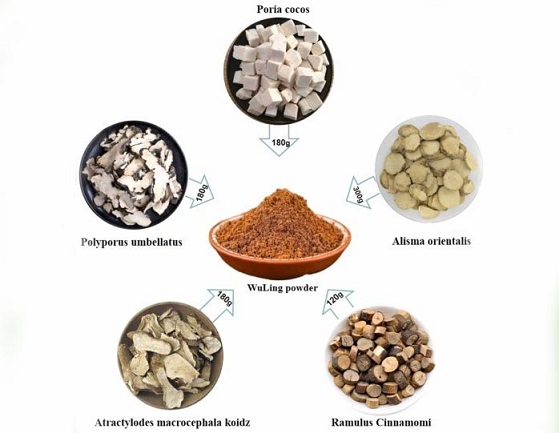Traditional Chinese medicine YinChen WuLing powder shows promise in treating non-alcoholic steatohepatitis
Nikhil Prasad Fact checked by:Thailand Medical News Team Jul 20, 2024 9 months, 17 hours, 20 minutes ago
TCM News: In an exciting development, researchers have found that an ancient herbal remedy known as YinChen WuLing Powder (YCWLP) could be effective in treating non-alcoholic steatohepatitis (NASH). NASH is a severe form of non-alcoholic fatty liver disease (NAFLD) characterized by liver inflammation and damage due to fat accumulation. This
TCM News report delves into the findings of a study conducted by a team from Heilongjiang Academy of Traditional Chinese Medicine, Heilongjiang University of Chinese Medicine-China, and First Affiliated Hospital of Hunan University of Chinese Medicine-China.
 Traditional Chinese medicine YinChen WuLing powder shows promise in treating non-alcoholic steatohepatitis
Understanding NASH
Traditional Chinese medicine YinChen WuLing powder shows promise in treating non-alcoholic steatohepatitis
Understanding NASH
NASH is part of the spectrum of NAFLD, a condition that affects a growing number of people worldwide due to rising rates of obesity and metabolic syndrome. Unlike alcoholic liver disease, NASH occurs in individuals who consume little to no alcohol. It can lead to severe liver damage, cirrhosis, and even liver cancer if left untreated. Currently, there are no approved medications for NASH, making the search for effective treatments urgent.
Traditional Chinese Medicine and YCWLP
Traditional Chinese medicine (TCM) has long been used to treat various ailments, including liver diseases. YCWLP, a blend of several herbs, has been documented in historical texts and is known for its ability to treat liver-related issues. The formula includes Artemisia capillaris herba, Polyporus umbellatus, Poria, Alismatis rhizoma, Atractylodes lancea, and Cinnamomi ramulus. Modern research has begun to validate the efficacy of these ancient remedies, and YCWLP is no exception.
The Study's Approach
The researchers employed a multi-faceted approach combining network pharmacology, molecular docking, and in vitro experiments to uncover how YCWLP works against NASH. They began by identifying the chemical components of YCWLP and predicting potential targets using various databases. The team constructed a protein-protein interaction network to understand how these components interact with biological targets involved in NASH.
Key Findings
One of the most significant discoveries was that a compound within YCWLP targets a protein known as SHP2. SHP2 plays a crucial role in cellular signaling pathways that regulate lipid metabolism and inflammation, both of which are critical in NASH development. The in vitro experiments validated that YCWLP can significantly reduce lipid accumulation and liver enzyme levels, which are markers of liver damage.
Detailed Results:
-Reduction in Lipid Levels: The study showed that YCWLP-treated cells exhibited a remarkable decrease in total cholesterol (TC) and triglyceride (TG) levels compared to untreated NASH cells.
-Liver Enzyme Improvement: Alanine aminotransferase (ALT) and aspar
tate aminotransferase (AST), enzymes that indicate liver damage, were significantly lower in the YCWLP-treated group.
-Pathway Modulation: YCWLP enhanced the phosphorylation of SHP2 and downregulated the SHP2/PI3K/NLRP3 signaling pathway. This pathway is associated with inflammation and cell death (pyroptosis), suggesting that YCWLP helps reduce liver inflammation and damage by modulating this pathway.
In-Depth Mechanisms
The study's network pharmacology analysis identified 54 active phytochemical compounds in YCWLP that interact with 167 targets related to NASH. Functional enrichment analyses revealed that these targets are involved in several biological processes, including lipid metabolism, insulin signaling, and inflammation. Molecular docking studies showed that these compounds have a high affinity for SHP2, supporting the hypothesis that SHP2 is a critical target for YCWLP in treating NASH.
Future Directions
While the results are promising, the study acknowledges that further research is necessary. The researchers suggest additional in vivo studies and clinical trials to fully understand the therapeutic potential and safety of YCWLP for NASH treatment. They also highlight the need to investigate the specific active ingredients within YCWLP that are responsible for its beneficial effects.
Conclusion
This study represents a significant step forward in understanding how traditional herbal remedies can be used to treat modern diseases. The findings provide a scientific basis for the use of YCWLP in managing NASH and offer hope for new, effective treatments for this challenging condition.
The study findings were published in the peer-reviewed journal: Frontiers in Pharmacology.
https://www.frontiersin.org/journals/pharmacology/articles/10.3389/fphar.2024.1423903/full
For the latest
TCM News, keep on logging to Thailand Medical News.
Read Also:
https://www.thailandmedical.news/news/traditional-chinese-medicine-s-rujin-jiedu-decoction-a-new-hope-for-influenza
https://www.thailandmedical.news/news/new-hope-for-elderly-hip-fracture-patients-traditional-chinese-medicine-shows-promise-in-preventing-postoperative-delirium
